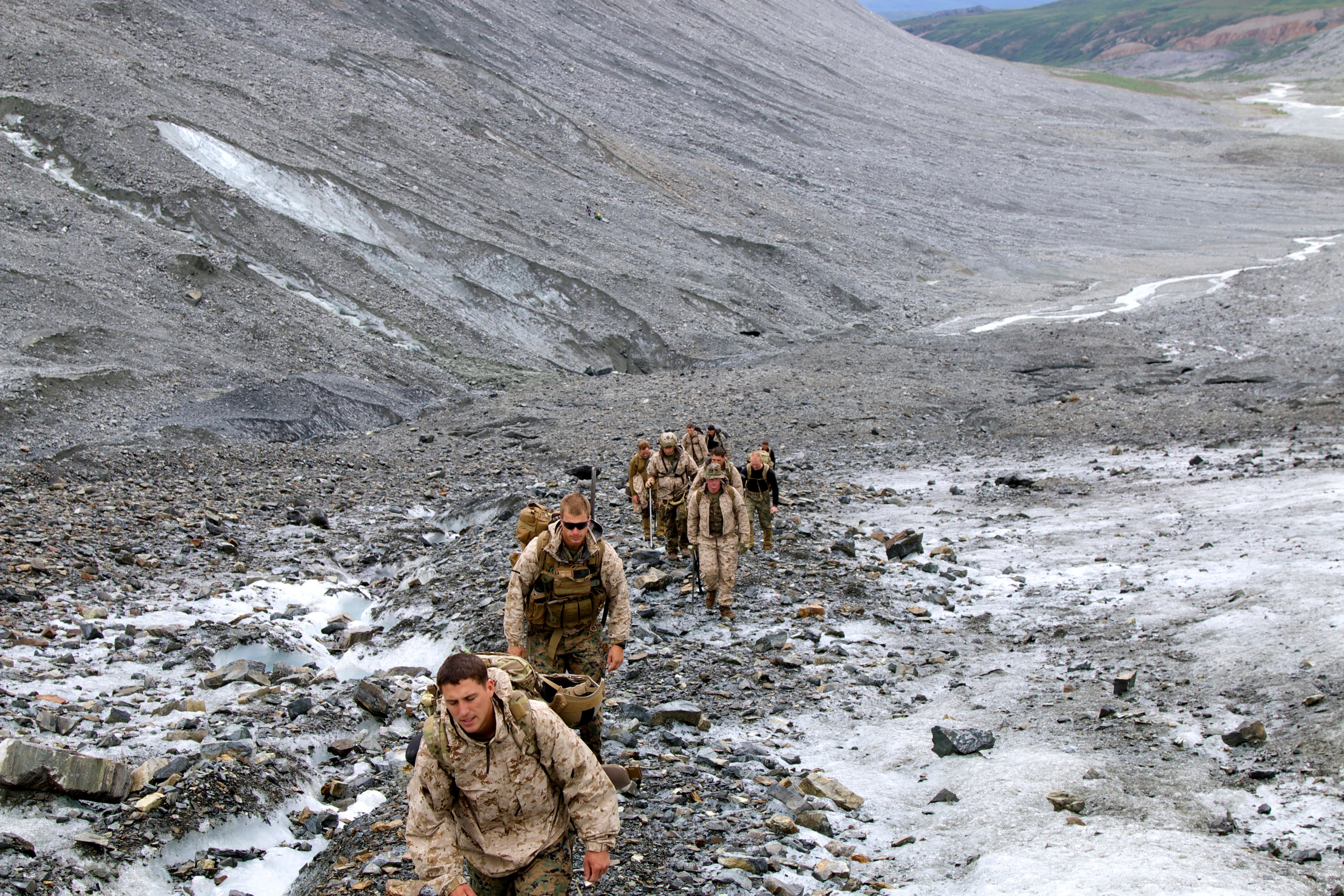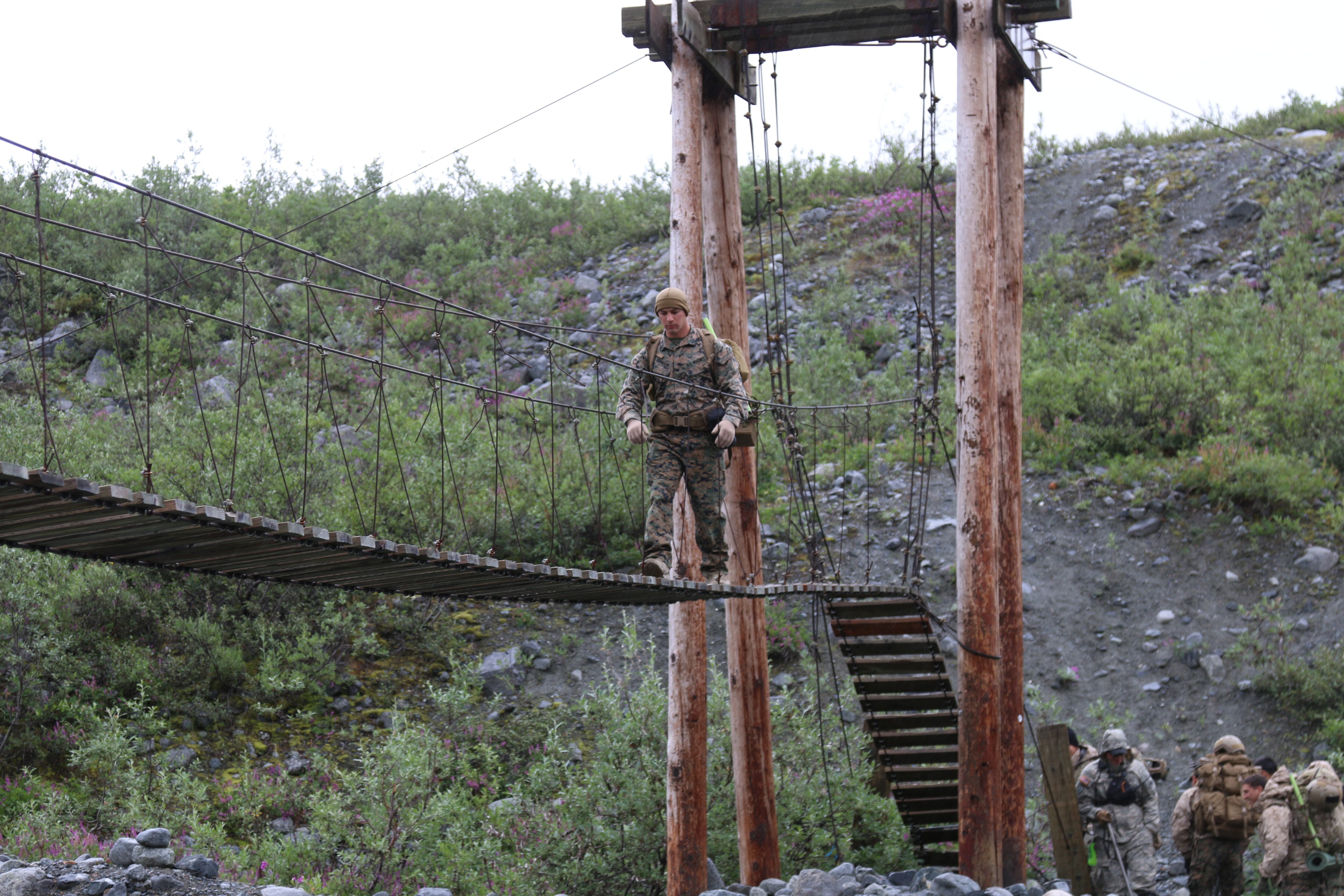About 20 recon Marines have wrapped up some tough Army-led training Marine Force Recon has just boosted their plussed-up their skill set – thanks to the Army – in the unforgiving mountains of central Alaska.
Marines from the 1st Reconnaissance Battalion completed a two-week-long course on this Friday at the U.S. Army's Northern Warfare Training Center, where they honed their mountaineering capabilities through long-distance tactical movement across the harsh terrain.
It was only he training event marks only the second time Marines have trained alongside with the Army there at NWTC since its founding in 1963. The first group moved through last summer, and the Marines now want to make it an annual are seeking to incorporate the event as an annual training exercise, said Capt. Trevor Miller, who led the Marines from Camp Pendleton, California.
"We have to be able to move safely and efficiently though any type of terrain, and "Mountains are especially key these days," he said. "We're Marines, so any climeand place, right?"
The training helps prepare the recon Marines for moving safely and efficiently in any environment, Miller said.
After four days of instruction on working with ropes, ascending and descending vertical faces and advanced navigation techniques using altimeters to measure altitude. The Marines moved out on a 10-mile hump 16-kilometer march up 7,200-foot-high mountains, which they completed within 48 hours.

From the snow-kissed mountains to the icy rumblings of melting glaciers, Marines from Camp Pendleton, Calif., along with instructors from U.S. Army Alaska's Northern Warfare Training Center, conducted military alpine operations on July 18 at Black Rapids Training Site and Gulkana Glacier, Alaska.
Photo Credit: Staff Sgt. Sean Callahan/Army
They next headed out to the Gulkhana glacier, a sprawling ice and rock formation in the Alaska Range mountains, where they practiced individual movement techniques with ice picks, rope movement and crevasse rescue techniques.
As a final capstone, the Marines then conducted coordinated long-range reconnaissance and surveillance patrols throughout the Black Rapids Training Site aboard the Army's mountain warfare center t NWTC, with six-man teams moving to observe areas of interested Named Areas of Interest identified by Miller.
"While we do a lot of long-range movement and stress our bodies out to the max a lot, it's not always that you get the opportunity to go over terrain like this," Miller said. "The terrain itself was incredibly grueling, incredibly severe, especially with the 60-pound rucks that these guys are wearing."
With expanding mission sets post-Iraq and Afghanistan, recon Marines Force Recon must ensure their core capabilities are up to par, including the ability to perform deep reconnaissance miles up to 30 kilometers behind enemy lines. They need the skills to operate independently in tough terrain or alongside service members from other branches, Miller said.
That's especially important as joint missions become more and more common, he added.
This means they need the skills to , according to Miller, having the organic skills set for teams to move independently through such terrain as well as to effectively operate with members of other branches of the Department of Defense. "More and more, the DoD is becoming a joint world," Miller said.
"While we all do similar missions, a lot of times the language we speak is different, and getting this kind of training opportunity helps ease that language barrier so that when we do meet down-range, we'll understand each other," he said.

Soldiers and Marines conducted military alpine operations on July 18 at Black Rapids Training Site and Gulkana Glacier, Alaska.
Photo Credit: Staff Sgt. Sean Callahan/Army
Army Sgt. 1st Class Kyle Kulka, NWTC lead instructor, said the Marines agreed, saying it was a unique opportunity to with other services and form a partnership with troops from another service.
"This is a really motivated group; it's nice working with a group of their caliber," Kulka said.
The Army trainers gained knowledge from the cadre at NWTC stand to gain from the Marines as well. The Marines bring with them the tactics and knowledge they use at , techniques and procedures employed at the Marine Corps' Mountain Warfare Training Center outside of Bridgeport, California.
"Any time you can share [tactics, techniques and procedures] TTPs and see 'Hey, here's how we do it and why' it adds a depth of perspective," said Lt. Col. Alan Brown, chief of public affairs for U.S. Army Alaska. "We've got instructors who are spending quality, in-depth time with the Marines. The next time they do this type of training, they're going to have those anecdotal lessons." Brown said.





